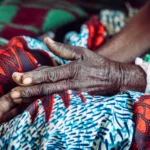When you first visit Mango, Togo you can’t help but notice the sky. The flat landscape and noticeable lack of surrounding trees make the sky appear vast and ever-changing. Foreboding storms in June, the smoky, sand-filled skies of January, the crystal clear November night skies showing off stars that hint at galaxies far away—it’s hard to keep from looking up.
I noticed the Southern Cross constellation for the first time in 2016. Since Togo sits near the equator, the well-known Southern hemisphere star formation sits low along the night horizon. I remember noticing it one evening as I walked along our dirt path, struggling with the events that had taken place over the previous few months. Even though there was nothing extraordinary in the moment, a time-stamp was marked in my memory, an Ebenezer of sorts, and I often mark the passage of time from that night. I remember thinking that the Lord who placed the stars in the sky could certainly see me on this dirt path and knows all that has taken place. As time passed, I would point out the constellation to visitors (since their North American homes couldn’t offer the view) and look for it each night as I strolled back and forth to the hospital.
Yesterday evening, a visiting nurse and I pulled chairs out into our guesthouse parking lot at 2am to watch the Gemanie meteor shower. I was already awake for a night-shift, and Josie set her alarm for the event. Missed sleep was no match for shooting-stars and a bowl of popcorn enjoyed in the chilly night air. I decided to download a star-gazing app on my phone to find new constellations and congratulate myself on ones I already knew: Orion, Cassiopeia, Ursa Major…. I confidently held up my phone to the Southern Cross and no little lines connected the 4 stars. I thought it strange, but moved on to others: Leo, Virgo, Pegasus…. I went back to the Southern Cross, assured now that the app was working correctly, and still…nothing. The app allows you to click on individual stars, which I did: “Epsilon Carinae” I read, “also known as Avior”. As I began to read aloud, “one of four starts that makes up the Asterism known as the False Cross. This is often mistaken for the Southern Cross causing errors in astronavigation.”
I’m sorry…..what?!?!
I realize it sounds ridiculous, but I was floored. Disappointed. Embarrassed. I had not only spent 4 years believing that was the Southern Cross, but also spent four years telling other people it was the Southern Cross! (my apologies if you are one of those people). I had spent the last four years, time stamping an event, a moment, that was based in something false. I hadn’t truly spent the time to ever find out I was interpreting what I was seeing, correctly. I had no reason to believe it wasn’t the Southern Cross since I didn’t even know about the False Cross.
A mature believer could probably look back and label things they believe about God, that they didn’t know before. They didn’t necessarily seek out the knowledge, because they didn’t know it was even missing! But the Lord brought them through a situation that made it abundantly clear that they lacked the knowledge or wisdom to respond well. Maybe the Lord brought someone alongside to teach them. Maybe life itself was crushing and they began to understand the Lord’s deliverance in a whole new way.
In medicine we say that the most dangerous situation is when we don’t know what we don’t know—when we aren’t aware there is knowledge we are missing; when we can’t even imagine there is information we are missing, and we feel as though we are already adequately informed. But when we know we have deficiencies, we can go find answers when we don’t have them or surround ourselves with people who have different expertise than us. That’s called wisdom.
I am all too familiar with the difficulties medical missionaries face in having to make decisions we weren’t trained to make. We carry the mistakes we’ve made with us like a heavy vest that never comes off. We can all tell stories of moral injuries that culminate from the agonizing decisions we make when resources are low-resources and acuity is high. It’s only on the other side of those things that we can look back and teach others to avoid the mistakes we made.
As medical missionaries we take our message seriously. We’ve left our families, our homes, to follow a call of Christ to reach every tribe, tongue and nation with the Gospel. We pledge our time, our lives to share the Good News, to dispel the “False Crosses” of the world and point them to the ONE who saves. A mature believer can look back and label things they believe about God, that they didn’t know before. They didn’t necessarily seek out the knowledge, because they didn’t know it was even missing! But the Lord brought them through a situation that made it abundantly clear that they lacked the knowledge or wisdom to respond well. Maybe the Lord brought someone alongside to teach them. Maybe life itself was crushing and they began to understand the Lord’s deliverance in a whole new way.
Iron 2 Silver wants to help stand in the gap that exists in medical missions between what we are expected to do, and what we were trained to do. We want to facilitate open conversations, not only between our team and yours, but between medical mission fields, in order to learn from one another and push towards the best possible care in the countries we serve. We hope we will continue to learn things from one another and force the conversation, “Are we doing what is best?” We want to normalize the idea that we might not be doing what is best, and be willing to admit mistakes so that we can share best practices across fields and specialties. As medical missionaries we often need to lay down the false cross of, “I can do it all”. We are prayerful and hopeful that as we start this blog, it will be a resource for you and a starting line for critical thoughts and dialogue surrounding the uniqueness of practicing medicine on a mission field. We welcome your feedback and insights. May the Lord bless your work as you work unto the Lord in all you do.



